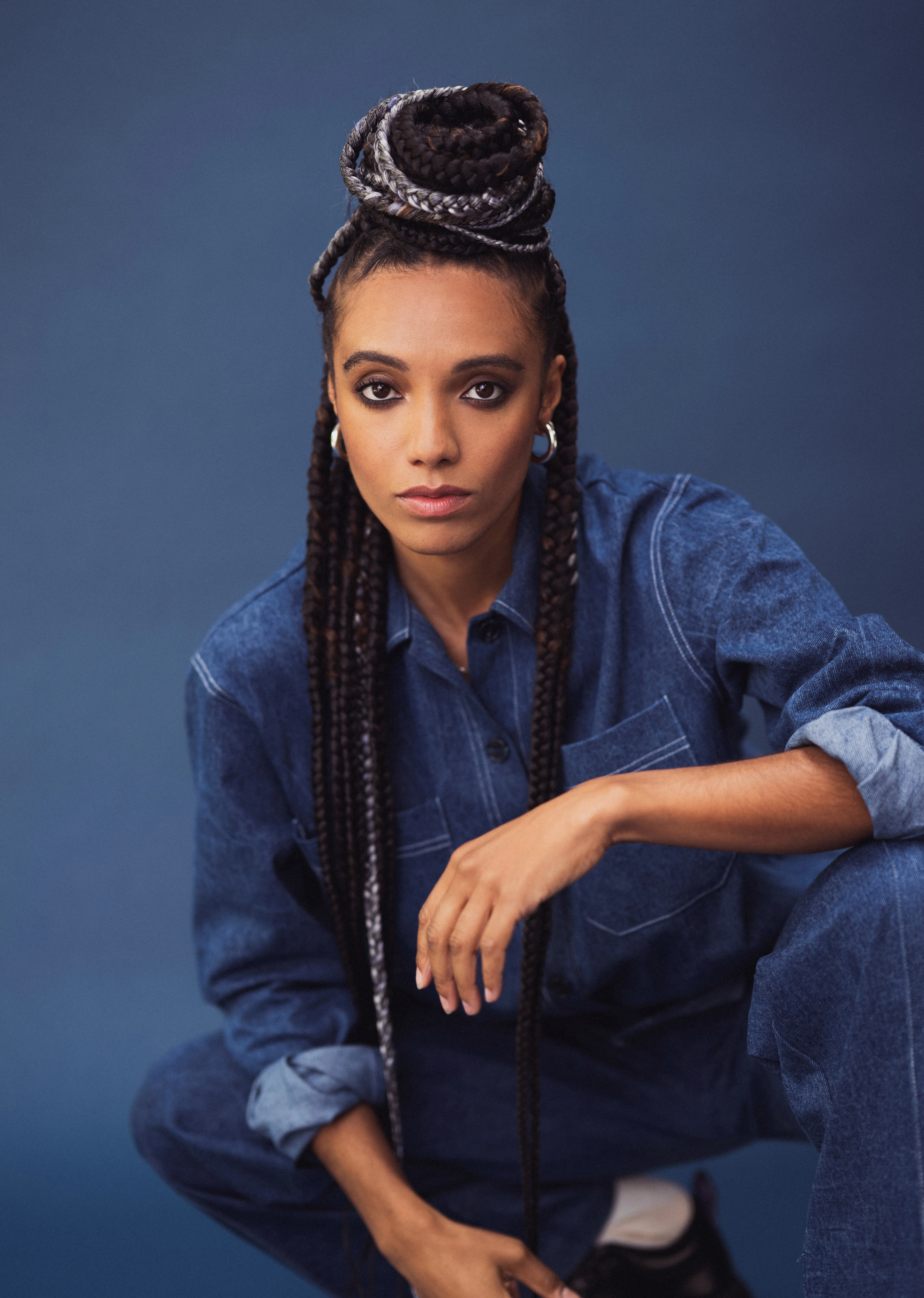
Maisie Richardson-Sellers
The Undeclared War is a cyber-thriller that, despite being filmed over a year ago, is more relevant now than ever. It’s a sentiment that actor Maisie Richardson-Sellers shares.
In a world where everyone is connected, it’s hard to think being online could be detrimental. In Peter Kosminsky’s The Undeclared War, the foreshadowing — from Johnson being ousted to the threat of Putin — is more than unnerving. For actor Maisie Richardson-Sellers, they see the show as a lesson in factchecking. In the show, Richardson-Sellers shines as the whipsmart Kathy, a tech analyst. Coming from a military background, Kathy has a narrow-focus on what she’s meant to do — and aims to prevent things happen before they can occur. It’s a role that showcases Richardson-Sellers’ dynamic, unique approach to every character they step into.
1883 Magazine’s Kelsey Barnes chats with Maisie Richardson-Sellers about filming The Undeclared War, their production company and more.
Your first credit was back in 2012. How do you think you’ve grown and developed as an actress between then and now?
Gosh, in a multitude of ways! I was still a teenager then. I feel like my 20s were largely about unlearning and rebuilding. About challenging myself and the world around me. This has enabled me to draw from parts of myself that I didn’t use to have access to. I’ve also been fortunate enough to film in Cape Town, Atlanta, Vancouver and London, and the people I’ve encountered along the way, both on and off set, have gifted me with many tools for my creative toolbox.
You play Kathy in the TV thriller The Undeclared War. Can you tell me a bit about the show and your character?
The show takes you into the inner world of GCHQ and follows a leading group of analysts as they try to prevent potentially catastrophic cyber attacks on the UK. Kathy is one of these analysts. She’s a New Yorker with a quiet strength and an extremely clear sense of right and wrong. As a black, queer woman, she doesn’t see herself reflected back to her in the very homogenous working space, and when a young work experience student (Saara) appears, they quickly grow close. During the season they stumble upon a potential election-altering cyber attack and find themselves faced with choosing between their moral and their professional duties.
What attracted you to the show? Was it the character, script, who was involved in the show, etc?
As soon as I saw Peter Kosminsky’s name as the director/writer, I was excited. I love his work. He manages to tell very human, moving stories against rigorously researched and politically forward-thinking backdrops. GCHQ is an extremely secretive government organization that most of the public knows very little about. As our presence becomes increasingly online focused, the risk and impact of cyber attacks and warfare are only going to keep growing. I wanted to learn more about this world and to help pull back the veil of mystery for others.
The show is centred around a British general election that involves the UK’s first Black Conservative Prime Minister. I spoke with your co-star Hannah about this already, but I’d love to hear your thoughts! Her character faces some pushback from her family as they believe the GCHQ is an organization that monitors them unfairly. What was it like working on those topical and relevant themes on-screen?
It was a dream! There is no right or wrong, good or evil in the show. Which I think is more reflective of real life. Our characters and storylines dive head first into the grey area between these poles. The show navigates prejudices, morality and political game playing in a way that challenges the audience, but ultimately allows them to reach their own conclusions on where they stand.

You all filmed it last summer and it’s timelier than ever now. Has it been interesting to see issues that are prevalent in the show play out in real-time?
Very much so. Peter’s detailed research for the show over the past 5 years, as well as the fact that the technology already exists for all of the cyber attacks in the show to take place, means that the show has always felt very close to reality for me. But it was eerie to see the shifting dynamics between the West and Russia, as well as Boris Johnson’s exit, happening almost simultaneously alongside the airing of our similar storylines.
Has the show changed the way you view your own online activity?
The show has definitely strengthened my wariness but also shown me just how hard it is in reality to hide anything. If someone with the right technology and experience is determined to find it, they most likely will, and that is deeply unnerving. I found it fascinating learning about ‘bots’, and the power they have to influence the masses. My biggest takeaway is to be overly cautious, and fact check, fact check, fact check!
Is there a scene in particular that sticks out to you when you think back to your time filming?
There’s a scene near the start of episode one in which Danny (Simon Pegg) pulls the staff together in order to tell us about the huge cyber attack that occurred that morning. It was Simon’s first day on set, and he opens the scene with a long monologue in front of around 30 of us, with the incredible Alex Jennings by his side. I was absolutely flawed by how organic and detailed his performance was, my heart was racing when I had to chime in with my lines towards the end! It was a real lesson in acting watching him. I learned so much by working with Simon and Alex during the show. They are also both such brilliant humans, we had a lot of fun both on and off set.
Let’s chat about your production company, Barefaced Productions! It aims to bring marginalized individuals to light not just on-screen, but behind the scenes as well throughout the creative and filming process. Firstly, what inspired you to start it?
I have always been very conscious of the positive influence that the nuggets of representation I was able to find growing up had on my life. For example, The L word played a huge role in my acceptance of my sexuality and coming out when I was 15. When I began acting, once again I noticed just how little representation there was both behind and in front of the camera. And as a result, the stories that I wanted to see/ be in were so rarely being created. So I decided that it was time to create them myself. I have built a wonderful community of creatives from around the globe, and often what is missing in order to facilitate their scripts from coming to fruition are resources, access or/and creative support. Barefaced Productions was born out of a desire to fill this hole.

Is there a specific moment where you felt like the work you were doing with Barefaced was making a difference?
When we were doing the festival circuit with ‘Sunday’s Child,’ the first short film I directed, the response was incredible. The film follows a young woman of colour who is struggling with her mother’s response to her sexual identity, as well as being isolated after moving to a new city. Meeting so many individuals from such a range of backgrounds that felt seen and moved by the film was very powerful. For those who have yet to experience acceptance or the support of a loving community, the film was intended as a message of hope. So to hear that it was successful in that for many people meant a huge amount. When a piece of art I create becomes a catalyst for discussion or a place of comfort, that is when I know I have done my job.
You co-wrote and directed Sunday’s Child. What was that experience like? What did you learn about yourself while directing your first project?
All of our department heads were female, and the majority of the crew were women of colour/queer, so to create an environment that reflected the story being told was truly magical. People were able to contribute ideas and nuances from experience, and we just had an absolute blast. I learned that I am actually very calm in overwhelming/ panicked situations (which was a huge surprise), and also it was this project that made me tumble head over heels in love with directing.
Lastly, if you could manifest something for yourself this year what would it be?
By the end of this year, I am manifesting at least one full draft through writing my first feature film. The time has come!
The Undeclared War is out now.
Interview Kelsey Barnes
Photography Pip





